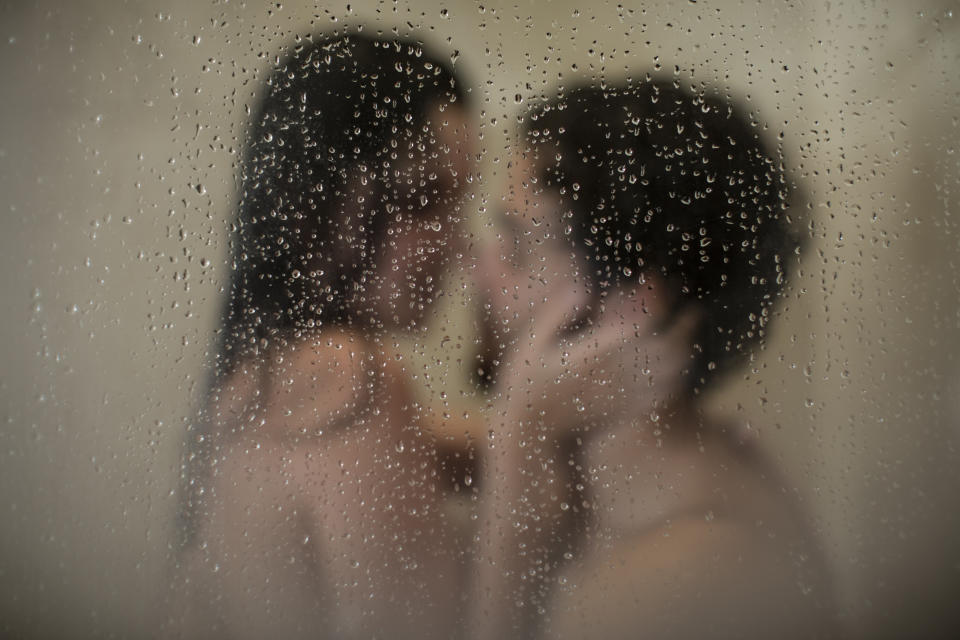5 Fantasies Women Think Are Underrepresented In Porn — And Why It Matters
A new survey is shedding light on women’s porn preferences — and you might find some of the results surprising.

Bloom, an erotic audio platform, surveyed 300 adult users about the fantasies they’d want to see more of in porn and erotica. They found these were the top five most popular themes among women (the percentage indicates the number of female respondents who said they’d like to see more of it).
1. Threesomes (77%)
2. Women receiving oral (54%)
3. Romantic sex (52%)
4. Rough sex (52%)
5. Domination (50%)
Though we were surprised to see “threesomes” at the top of the list for women, the sex experts we interviewed didn’t necessarily feel the same way. They offered some interesting insights into why some of these tropes are so popular.
Our sexual fantasies empower us to “combat feelings of inadequacy or self-doubt,” Los Angeles clinical psychologist Nazanin Moali, host of the “Sexology” podcast, told HuffPost. So they serve a crucial function, especially for women who may have been conditioned to feel shame around their sexuality, she explained.
“For instance, in a scenario involving a threesome, one might visualize themselves as not only desirable but also proficient in satisfying multiple partners,” Moali said. “This serves as a counterweight to the self-doubt enforced by societal expectations.”

Therapist and sexologist Nicoletta Heidegger, host of the “Sluts and Scholars” podcast, told HuffPost she was not surprised by anything that made it into the top five, as the findings here are in line with similar surveys and research on the topic. (She also pointed out that people who already use an erotic audio platform are not necessarily a representative sample of the general population — an important thing to note when looking at the results.)
For sex researcher Justin Lehmiller’s 2018 book, “Tell Me What You Want,” he surveyed more than 4,000 Americans about their fantasies and found that group sex — threesomes in particular — were indeed one of the most common turn-ons. But there was some variation in how likely people were to voice this fantasy, how likely they were to act on it and how likely there were to enjoy the experience if they did.
Straight women were the least likely to share their group sex fantasy, the least likely to act on it and have the least positive experience when they do. Women with any degree of same-sex attraction (lesbian, bisexual, queer or pansexual) were more likely to talk about these group sex fantasies, more likely to act on them and more likely to have a positive experience when compared with straight women.
Moali said she believes there’s an “intriguing connection” between women’s fondness for romantic intimacy and their appreciation of oral pleasure, which both made the top five.

“The depiction of women receiving oral sex has witnessed a surge in various romantic storylines, like ‘Bridgerton,’ possibly portraying it as the ultimate gesture of love and acceptance,” she said. “For numerous women, it goes beyond mere physicality, underscoring the importance of feeling valued and cherished. This narrative resonates with the preference for adult content that accentuates emotional bonds.”
And it doesn’t come as a shock that more than half of women showed an interest in seeing more rough sex and domination in porn, both of our experts said.
According to Heidegger, there are many reasons these kinds of fantasies are so popular among cis women. For one, many women are in charge of so much at home and at work in their everyday lives that the idea of letting someone else call the shots for a bit is appealing.
For others, it’s a chance to reclaim their sexual desires after having negative or unwanted sexual experiences.
“If you are a woman, chances are you have experienced some type of non-consensual encounter — unwanted eyes, unwanted comments, unwanted touch,” Heidegger said. “Fantasy is a place for us to re-narrate and take ownership of our desires and stories again. To create a new narrative and a corrective experience in our mind for past painful experiences.”
One thing that did surprise Heidegger about the Bloom survey was what was not on the list.
“I am surprised, however, that there wasn’t a higher percentage of gay and lesbian themes, as those are usually highly watched for women,” she said.
Porn Preferences In Men And Women

When asked about the differences between what men and women generally want to see in porn, Heidegger explained that it’s “not so binary.”
“There are some gender differences, but a lot of science, including Lehmiller’s book ‘Tell Me What You Want’ and other research, says cisgendered men and women fantasize about many similar topics,” she said. “The way they interact with these desires may look different, however.”
One of the differences across genders is how much men and women prioritize a narrative in the sexual content they consume. Generally speaking, cis women report caring more about the context, setting and story, Heidegger said.
“This may be due to estrogen-driven folks having more responsive desire, as opposed to spontaneous desire,” she said. “This is often why many women turn to audio erotica or erotic content made by women.”
Moali agreed that women tend to gravitate toward porn with “narratives that carry emotional depth and context” and “a storyline or character development.”
Men, however, have historically been drawn to more “visually explicit content,” Moali said, “like videos showcasing different sexual acts.”
“Although the landscape of porn has evolved in the past decade, historically, explicit content has been primarily tailored towards men, lacking emotional depth between characters,” she said.
Another factor to consider: Women may have underlying safety concerns when it comes to sex, which makes backstory more important to their enjoyment, Moali said.
“Those with past sexual trauma might find it triggering to engage without a relational context, with fears for the safety of all involved hindering their experience,” she said. “Contextual pornography can provide a safer avenue for sexual exploration.”
When talking about these differences, it’s important to consider the “why” behind them, said Heidegger. Some believe innate gender differences determine what sexual content we’re drawn to, while others acknowledge the role that social and cultural conditioning play “in our beliefs about what is acceptable for us to like,” she said.
This “can affect what kinds of content or things we interact with — or give ourselves permission to interact with,” Heidegger said.
“In other words, are ‘boys’ just born to love trucks and the color blue? No. Though the research is growing, there is still a greater need for studies that looks at more diverse, cross-cultural LGBTQ+ fantasies and desires.”This article originally appeared on HuffPost.
